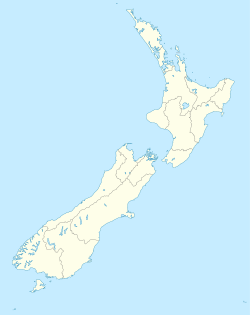Te Uku
| Te Uku | |
|---|---|
| Village | |

Te Uku Four Square, Roast Office and Mount Karioi
|
|
| Coordinates: 37°49′45″S 174°57′24″E / 37.82917°S 174.95667°ECoordinates: 37°49′45″S 174°57′24″E / 37.82917°S 174.95667°E | |
| Country | New Zealand |
| Region | Waikato Region |
| District | Waikato District |
| Elevation | 40 m (130 ft) |
| Population (2013 census) | |
| • Territorial | 249 |
| Time zone | NZST (UTC+12) |
| • Summer (DST) | NZDT (UTC+13) |
Te Uku is a small, mainly farming, settlement on SH23, 34 km (21 mi) from Hamilton and 11 km (6.8 mi) from Raglan. It has a 4-Square shop, church, coffee stall and art gallery, filling station, hall, school and Xtreme Zero Waste recycle bins.
Apart from a census 'area unit' covering several other settlements, Te Uku has no defined boundaries. Until Te Uku Post Office opened in 1894, Te Uku was usually referred to as Waitetuna, a name now used for another small settlement 8 km (5.0 mi) to the east.
The name is said to be derived from a clay hill in the district. However, 'uku' also translates to a flat-fish, skate.
Te Uku area unit covers all of Waikato District south of Whaingaroa Harbour, with the exception of Raglan, stretching from Waitetuna, through Okete, Kauroa and Te Mata to the coast at Ruapuke and Aotea Harbour. In 2013 its population was 1,896, with 681 households.
Te Uku store and surrounding buildings are on the boundaries of meshblocks 0860600 (north of SH23) and 0860900 (south), which had these census figures
Population
Households
Average income
Year
north
south
total
north
south
total
north
south
2001
87
84
171
30
30
60
$20,200
$20,400
2006
105
96
201
39
39
78
$27,500
$32,500
2013
126
123
249
42
39
81
$34,200
$45,000
The village lies in the Matakotea valley, which is a tributary of the Waitetuna River. Most rocks in the area are volcanic. The village, and most of the land to the west, is on Hamilton Ash; a 350,000 year old, strongly weathered, mainly yellow-brown, clay-rich, airfall tephra, of rhyolitic and andesitic composition, which includes corroded quartz crystals, weathered hornblende and augite, halloysite nodules, and some manganese. The hills to the north are of Okete Volcanics. The vertical offsets of the Vanhoutte, Mangawhero and Mangakino Faults reach a maximum of over 250 m (820 ft) near Te Uku trig. The hills to the south of the fault line are of Coleman and Waiharakeke Conglomerates and Puti and Waikorea Siltstones, all of Puaroan age (about 150 million years ago), with 2 million year old Okete Volcanics forming the highest points.
...
Wikipedia

